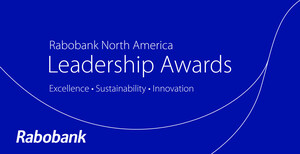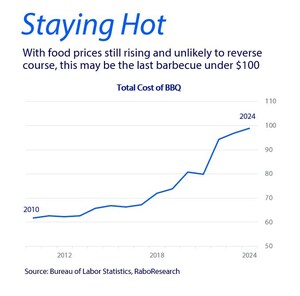Rabobank Report: Engagement Of Global Food & Agri Companies Essential For Sub-Saharan Africa To Reach Full Food & Agri Potential
NEW YORK, Oct. 17, 2013 /PRNewswire/ -- Rabobank has published a new flagship report about the need for global food and agri (F&A) companies to help realize the significant untapped agricultural power of sub-Saharan Africa. In the report, titled "How global companies can help sub-Saharan Africa reach its F&A potential," Rabobank calls for F&A companies to increase their engagement with the region by acting as significant catalysts in sub-Saharan Africa's F&A development.
Rabobank sets out four zones of opportunities and five keys to success to improve Africa's F&A capacity and help it meet the world's increasing need for food. The report was presented by Rabobank Executive Board Chairman Piet Moerland at the Rabobank Duisenberg Lecture held in Washington, D.C. on October 13th in conjunction with the annual meetings of the IMF and World Bank.
Rabobank's report comes at a time when the rampant increase in demand for agricultural commodities and stagnating supply growth have created an era of scarcity and higher price volatility. At the same time, the bank says, the gap between Africa's actual and potential agricultural output is widening.
"Given the recent developments and fewer growth opportunities in the global F&A sector," says Bill Cordingley, Head of Food & Agri Research for Rabobank in the Americas and report co-author, "global companies will need to look to markets like Africa to sustain future growth rates. There are increasing numbers of global F&A companies engaging with Africa, as illustrated in our report, but they need to go beyond the initial investment and knowledge-building stage where many of them stop. The more challenging step is to identify specific value chain opportunities and credible local partners who can co-invest or become a supplier. Nothing works in Africa without partnerships or supply chain alignment. But for those companies that get it right, the rewards will be considerable."
Rabobank believes many more F&A companies need to change their mindset and take steps now to commit to Africa on a long-term basis. In both helping Africa reach its F&A potential and addressing the increasing requirements of Africa's emerging urban consumers, global F&A companies will need to adapt their business models to the circumstances on the ground. But there are some overall principles which Rabobank identifies for where global companies should focus their efforts and how they can deliver a successful outcome.
The report identifies four zones of opportunity where global F&A companies should focus:
1. Increase production sustainably – address the yield gap in existing farming operations, expand operations where possible and develop new land resources.
2. Add value by building sustainable supply chains for all players – reduce risk, improve productivity and access to capital and markets; minimize waste and locate processing close to production.
3. Become regionally and globally export competitive – utilize market access and insights; unblock infrastructure bottlenecks. (In particular, Rabobank identifies export opportunities for African cocoa, coffee, cashew nuts, palm oil and sugar.)
4. Address African consumers' increasing and changing requirements – the local market will be key to success.
Rabobank's report also identifies five keys to success in creating a sustainable African strategy:
1. Adopt an inclusive approach - build trust, mutual respect and create mutual value along the value chain, respecting local rights and interests.
2. Make a long term commitment –demonstrate trust by co-investing in infrastructure and supporting local market development.
3. Establish supply chain partnerships – develop robust, multi-year supply agreements that align interests along the chain, combining local and global approaches and expertise.
4. Bring unique capabilities, not just capital – include access to technology, expertise, markets, customers and leadership so global companies are "needed" not just "used."
5. Reduce risk in the supply chain and secure finance – facilitate supply chain finance, and improve prospects for commercial finance being made available to local and regional F&A companies.
While the macro-level picture of Africa's economic and social development is increasingly positive, this only increases the strain on an already lackluster F&A sector. Africa's share of global agricultural exports is falling, while imports of many foods are rising. The continent's supply chain infrastructure lags well behind the rest of the world. As a result, African consumers are paying more for basic food commodities, have fewer choices and face higher food safety and security risks than consumers in most of the rest of the world. Africa must act now to close the gap.
Agribusiness and the wider food sector have yet to emerge in Africa, where agricultural production currently represents over 60% of the entire value chain (source: the World Bank). Globally the figure is 22%, with the remainder being derived from off-farm value creation, demonstrating the opportunity and challenge for global F&A companies. The opportunity for global F&A companies also lies in Africa's domestic food market, which is expected to rise threefold from USD 313 billion today to USD 1 trillion by 2030 (source: the World Bank). Over half of the demand will come from growing urban centers, where the rapidly increasing middle-class will require higher quality food and the infrastructure to support this.
Justin Sherrard, Senior Rabobank analyst and report co-author, concludes, "F&A companies face the challenging but ultimately rewarding task of building successful businesses in Africa, which will in turn help African F&A to meet its great untapped potential. If these companies succeed, Rabobank expects global capital and F&A know-how to flood into Africa in an unprecedented way."
Rabobank's report on how global companies can help sub-Saharan Africa reach its F&A potential is available to media upon request.
About the Rabobank Duisenberg Lecture
Now in its tenth year, the Duisenberg Lecture addresses topics close to the bank's heart as a leading food and agribusiness bank, and topics that are relevant to the international development agenda. The event is named after the late Dr. Wim Duisenberg, former President of the European Central Bank and Vice-Chairman of the Executive Board of Rabobank Nederland (1979-1981).
At the 2013 Duisenberg Lecture held in Washington, D.C., Piet Moerland, Executive Chairman of Rabobank's Executive Board, presented the report to Don Thompson, CEO of McDonald's Corporation.
Rabobank Group is a global financial services leader providing wholesale and retail banking, leasing, real estate services, and renewable energy project financing. Founded over a century ago, Rabobank is one of the largest banks in the world, with nearly $1 trillion in assets and operations in more than 40 countries. In North America, Rabobank is a premier bank to the food, beverage and agribusiness industry. Rabobank's Food & Agribusiness Research and Advisory team is comprised of more than 80 analysts around the world who provide expert analysis, insight and counsel to Rabobank clients about trends, issues and developments in all sectors of agriculture. www.rabobank.com/f&a
For a social media-ready version of this press release:
http://rabobank-food-agribusiness-research.pressdoc.com
Follow us on Twitter: @rabofoodagri
SOURCE Rabobank
WANT YOUR COMPANY'S NEWS FEATURED ON PRNEWSWIRE.COM?
Newsrooms &
Influencers
Digital Media
Outlets
Journalists
Opted In






Share this article